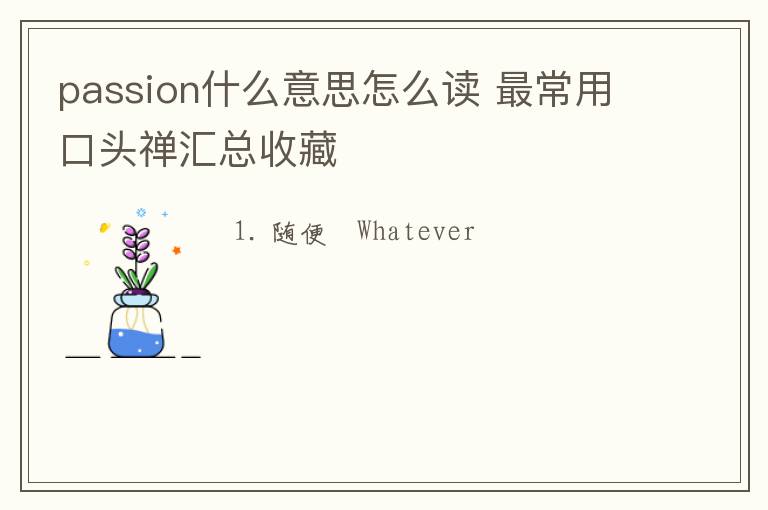
1. 随便
Whatever
"whatever"原意为“不管怎样,无论什么”。当你想结束话题停止争吵,或者想表示什么都行,不怎么在意时就可以说"whatever"。但是有调查显示,"whatever"是美国人最反感的口头禅,使用的时候也要小心谨慎哦。
例句:
A: Hey, let‘s go to the cinema tonight. Or what about the museum?(嘿,今晚一起去电影院吧,或者去博物馆?)
B: Yeah, whatever.(随便吧。)
2. 你真是3分钟热度
3-minute passion
"passion"意为激情、热情,这个短语非常容易记忆,和中文意思也完全符合。
例句:
A: I would like to learn piano therefore I will need to buy one. (我想学钢琴,所以我要去买把琴。)
B: Oh, I suggest that you think carefully before you buy one as you are always a ‘3-minute passion‘ person.(我建议你考虑清楚,因为你总是3分钟热度。)
3. 改天吧
Rain check
“改天吧”经常出现在懒人或大忙人的口中,相当于英语中的"rain check"。该短语来源于美国的棒球文化,如果球赛进行时天公不作美,骤然倾盆大雨不得不暂停,观众可领“雨票”,或用原票存根作为“雨票”(rain check),球赛改期举行时可凭之入场。
后来,这短语就不局限在体育赛事方面了,保留了原义运用到生活中,就变成了“改天吧”。
例句:
A:How about a cup of coffee? (去喝杯咖啡?)
B:Rain check.(改天吧。)
4. 看着办吧
play it by ear
及时行乐的人经常会将"看着办吧"挂在嘴边,英语的说法是"play it by ear"。为啥会和耳朵有关呢?
这句短语原是音乐用语,指某人仅凭听过的记忆就可弹奏乐曲。由此意引申出来后,"play by ear"强调事件的“即兴”成分,没有计划、依据当时情况而行事(to let things go as they may),很有“边走边看吧,走着瞧”的味道。
例句:
A:What are you doing tonight? (你今晚有什么安排?)
B:Oh, I don‘t know...I‘ll just play it by ear.(不知道唉,没啥安排,看着办吧)
5. 真是白费力气
to beat a dead horse
"To beat a dead horse"出自古罗马戏剧,在喜剧大师Plautus的剧作里,主人公狠命抽打一匹已经死掉了的马,希望能把“它”抽活,继续为主人托货物。可是,马都已经死掉了,除非有起死回生的能力,否则就是“白费力气,枉做无用功”。
例句:
A:Dad, are you sure we can‘t get a new computer? (爸爸,你真的决定我们不再添新电脑了吗?)
B:Son, we talked about this and the decision was ‘no‘. You are beating a dead horse."(孩子,这事儿我们已经谈过了,答案是‘不添’。不要再白费口舌了。)
6. 都是套路
to fall into one‘s trap/setup
"trap"和"setup"作为名词的时候意为“陷阱”,即“套路”。当陷入人家设的套路里了,可以说"fall into one‘s trap/setup"。如果你要给人家设套,就可以说"play games/tricks with somebody",把某人给“玩儿了”。
例句:
Don‘t buy his words. You will fall into his trap.(别信他的话,都是套路。)
7. 吃瓜群众
onlooker/spectators
“我们都是不明真相的吃瓜群众”,“吃瓜群众”这个词用来形容围观某事物、事件的人们。在英文中,"onlooker/spectator"意为旁观者、观众。坐在场边以看客的心态看事情的发展,哪里热闹就往哪儿看,就是“吃瓜群众”的典型特征啦。
例句:
Don‘t drag me into this. I am just an innocent onlooker.(不要拖我下水。我只是个不明真相的吃瓜群众。)